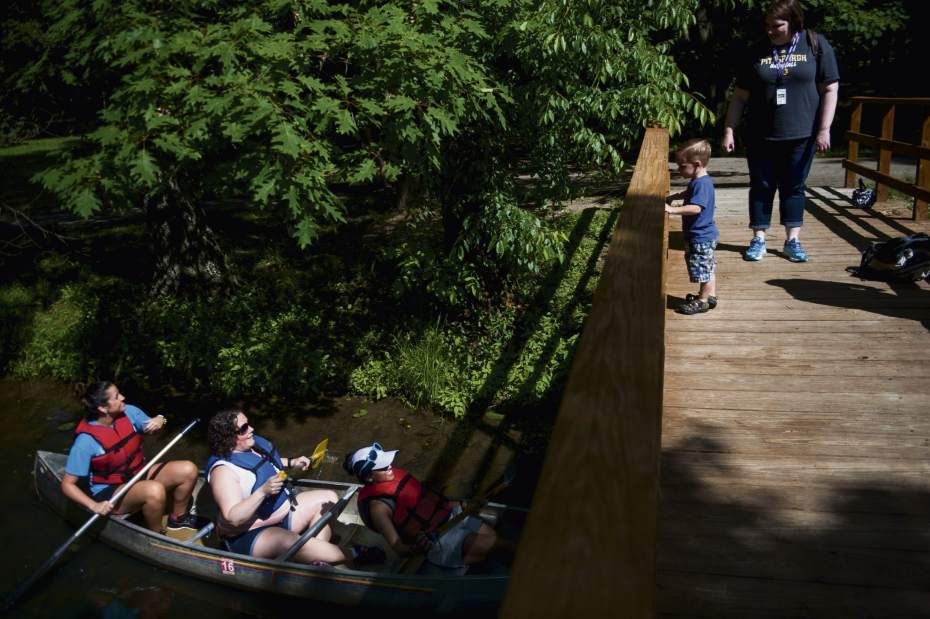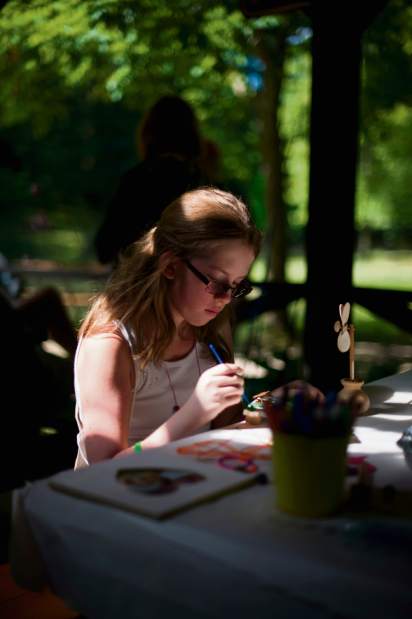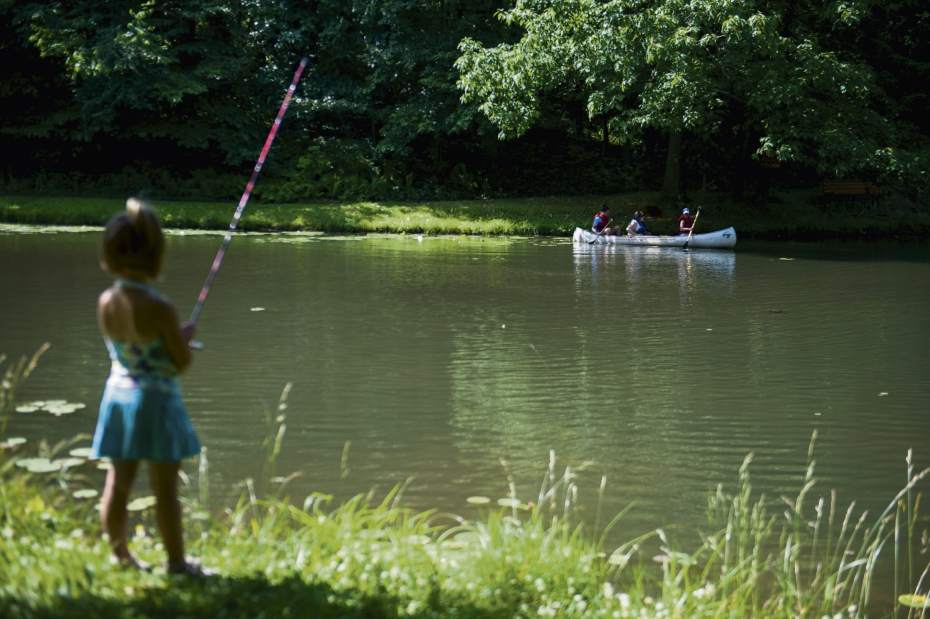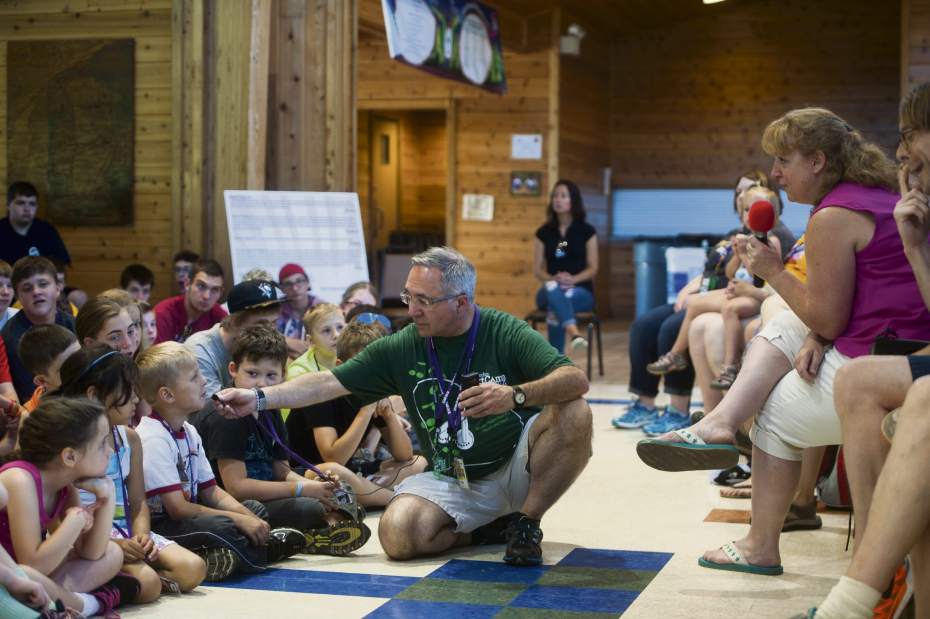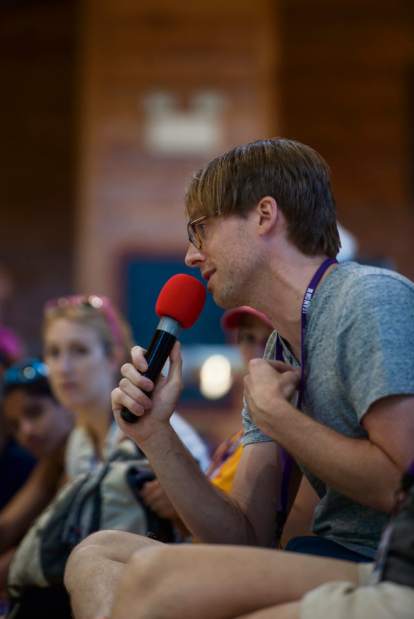Guests bond over shared experiences at Heart Camp for Kids
Eleven doctors and nurses sit in a row of chairs in the middle of the dining hall.
Before them, kneeling on the floor or sitting cross-legged, 120 children stare intently at them, taking turns asking questions.
Some are silly — Have you ever sleepwalked?
Others are personal — What college did you go to?
But most revolve around one theme, the most important one in their lives: What is wrong with me and why am I the way that I am?
“Why was I born with half a heart?” one child asks.
“Sometimes,” replies Dr. Susan Miller, a Children's Hospital cardiologist, “it just happens.”
···
I was born with a hole in my heart but I didn't get surgery until I was 7. Why?
Sometimes the hole doesn't cause problems yet. It's also easier to do operations on bigger people.
···
The children and doctors gathered last week in Fombell, Beaver County, for the 26th annual Dr. Bill Neches Heart Camp for Kids, which allows children ages 8 to 15 to experience a real summer camp.
Thing is — it doesn't look like a summer camp for sick kids.
It looks like a summer camp. Period.
On this day, there are children playing volleyball, fishing and canoeing in the pond and performing in flash mobs. There are arts and crafts, an archery range and an obstacle course. There is laughter and hugs.
And there are no signs of illness or restrictions, except when the kids go swimming.
Only then, do the long scars appear.
But here at Camp Kon-O-Kwee, the scars are not strange. Nearly everyone has one. Here, no one feels the need to hide the evidence of their defects.
···
Why did you wait to take the tubes out of my solar plexus until after I woke up?
To guard against bleeding and fluid buildup. It's uncomfortable, but we have to leave it in, most of the time, until after you wake up.
···
When Dr. Neches, a Children's Hospital pediatric cardiologist, arrived in Pittsburgh in the early 1970s, he found terrified parents.
“There were no resources back then, other than the cardiologist, for parents to know what to expect,” Neches says shortly after the Ask-a-Doctor session. “They were petrified.”
So, in 1975, Neches started a support group for parents of children with heart disease, called Heart to Heart, which still operates. The idea was to connect parents of newly diagnosed children with parents of older children, patients who had been through the surgeries and treatments and come through safely. In this way, Neches says, parents could see the future.
Once a year, Heart to Heart families gathered for a picnic. The event was designed to connect parents. But it was the children, Neches noticed, who formed immediate bonds.
“And their bond was their heart disease,” says Neches, who retired from Children's Hospital in 2005. “They would seek each other out and go off together. But it was only one day a year.”
···
Why will patients sometimes go to sleep after their surgeries?
Because your body is recovering. You had a major operation. We gave you a lot of pain medicine. We want to keep you comfortable.
···
Thirty-two children attended Neches' first Heart Camp in 1991.
When they arrived, the kids saw the baseball field and immediately begged to play a game.
Staff said no, Neches recalls. After all, these children had heart defects. Surely they mustn't overexert themselves.
But the kids were determined.
Finally, counselors relented. They split the group into two teams of 16 and headed to the field.
“They played for two-and-a-half hours,” Neches recalls. “Kids who couldn't run, someone ran for them, but they all played. And they loved it. It showed us they could do things we didn't know they could do.”
···
Did I have stitches?
You had a lot of stitches.
Why won't my scar go away?
Scars are a different type of tissue. When your skin heals, it heals for function, not for looks.
···
Kelsey Hallinen was born with a hole in her heart and a pinched aorta, which prevented blood from reaching her lower body.
She was 8 when she attended her first Heart Camp. Today she is 24 and a camp counselor. This is her 17th consecutive year here.
Out there, in the real world, she says, campers often feel isolated, like outcasts. But here, for a week every summer, they enter an alternate universe where everyone feels normal.
“You're scared to go on the rock wall because it's too tall, not because you have a heart problem,” Hallinen says. “You know that everyone here has had your experiences. This is essentially my second family here.”
Hallinen is studying for her Ph.D. in biophysics. She intends to research heart disease.
···
When you're having open-heart surgery and they cut through your sternum, how do they get it back together?
Stainless steel wires act like a cast, and then your body grows over it.
···
Camp director Keith McIntire was born with a heart defect known as Tetrology of Fallot, which involves multiple abnormalities. He's had three major heart surgeries, the first in 1959 when he was 9 months old. Doctors opened him up to determine what was wrong, then told his parents to “take him home and love him,” McIntire says, because nothing could be done.
Yet, here he is, 57 years later, with a mechanical valve in his heart.
“Who knows why it happens,” he says. “But the fact that we lived — there's a reason why. It's to share our stories and make these kids' lives better. Coming here, being around all these people, it gives them hope.”
···
Why does a heart stop working?
There are lots of reasons. If it can't pump enough blood ... if the valves aren't working ... if the muscles aren't squeezing.
···
Several minutes after Dalton Myer jumped up and down during a group dance in the dining hall, he continues to smile.
“The rest of the year, I'm usually being annoyed by my sisters,” says Myer, 12, of Homer City. “But here I can bond with other kids who also have heart problems. Oh, I get excited to come here. Oh, yeah.”
For the campers, Neches says, the experience is a life-changer.
“Parents say to me, ‘What did you do to my child? My kid was introverted, self-conscious. This kid is confident and self-assured,' ” he says. “Everywhere else, these kids are treated differently — by their teachers, their parents, their siblings.
“Not here.”
···
Why do you do your job?
Because of you. You are all wonderful.
Chris Togneri is a Tribune-Review staff writer. Reach him at 412-380-5632 or ctogneri@tribweb.com.

